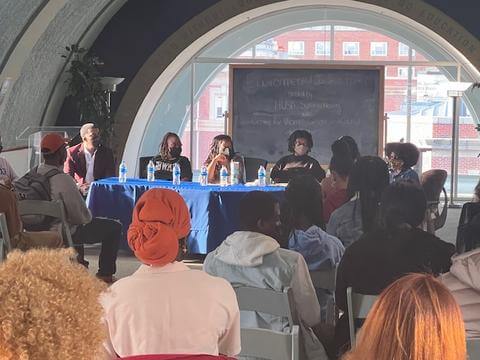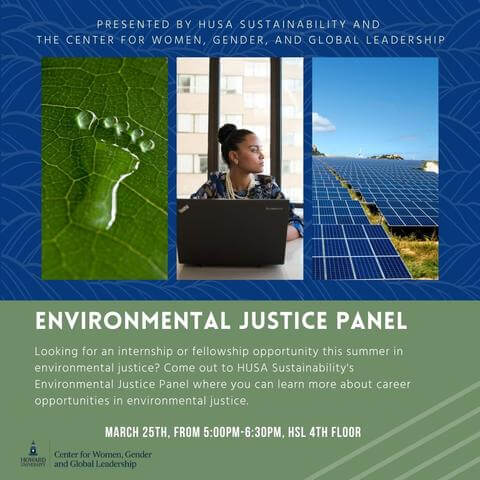Environmental Justice Panel
The Environmental Justice Panel hosted by HUSA Sustainability and Howard’s University Center for Women, Gender, and Global Leadership on March 25, 2022 was an insightful and informative event with a diverse range of panelists who serve as leaders in their communities. The Environmental Justice Panel was composed of Dr. Michelle Dovil, visiting Professor of Sociology, Gilbert Campbell, HowardAlum, CEO, Volt Energy Utility, Yinka Bode-George, Senior Manager of Environmental Justice and Community Impact at Volt Energy Utility, Destiny Hodges, Founder of Generation Green, Kari Fulton, Howard Alum, Award-Winning Environmental Justice Activist, Aissa Dearing, Director of HUSA Sustainability and co-founder of the Durham Youth Climate Justice Initiative
The Environmental Justice Panel discussed the intersectionality of environmental equity and the social movement of environmental justice. Many low-income minority communities lack access to the necessary resources they are reliant on to lead healthy and fulfilling lives. Stranded in food deserts and with limited access to adequate water, air, and proper living conditions various communities suffer from the decline of basic human necessities. Panelists drew attention to activism that highlights inequalities within the system that allows for the environmental exploitation of low-income communities, through the lack of funding and availability for sustainable resources. Attempts of assistance that come from outside sources, such as nonprofits, are short term and alienating as many communities must become reliant on temporary acts of aid. The panelists brought to light that while providing acts of service to increase the available resources, nonprofits may only provide temporary solutions to a bigger problem within these communities. By solely creating and running community gardens and handing out resources to those in need, they separate from community involvement and leadership. These outside sources do not solve the underlying issues and would not stop the cycle of environmental injustice from recurring in the same committees or in others. The panel found that the most impactful individuals towards the fight for environmental equity are those who already live in their own community. Strides made by family, friends, and neighbors have been found to yield the most effective change than any outside organization. Panelists shared their own personal stories of their fight for environmental justice, in all aspects of sustainability. Some panelists have been serving their districts by addressing many core problems within their own communities such as renewable energy, pollution, environmental racism, food justice, harmful emissions, and so much more. The Environmental Justice Panel urged Howard University students in attendance to go into their own communities and motivate positive change for their own neighborhoods'. As a member of a community, you serve as an expert on your environment and would be the best option to navigate the issues that plague your family members and neighbors. As an asset you can be the change we need in the world by being an advocate and leader for yourself and your community.


